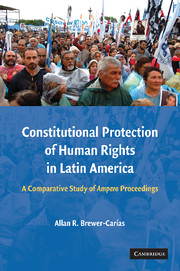 Constitutional Protection of Human Rights in Latin America
Constitutional Protection of Human Rights in Latin America Book contents
- Frontmatter
- Contents
- INTRODUCTION
- PART ONE THE CONSTITUTIONAL AND INTERNATIONAL DECLARATION OF HUMAN RIGHTS AND ITS JUDICIAL GUARANTIES
- PART TWO THE AMPARO AS A LATIN AMERICAN CONSTITUTIONAL AND INTERNATIONAL LAW INSTITUTION
- PART THREE THE INJURED PARTY AND THE CONSTITUTIONAL RIGHTS PROTECTED BY MEANS OF THE AMPARO PROCEEDING
- PART FOUR THE INJURY, THE INJURING PARTY AND THE INJURING ACTS OR OMISSIONS IN THE AMPARO PROCEEDING
- PART FIVE THE EXTRAORDINARY CHARACTER OF THE AMPARO PROCEEDING
- Chapter Seventeen The Question of the Admissibility of the Amparo Action and Its Relation with the Ordinary Judicial Means
- Chapter Eighteen The Main Principles of the Procedure in the Amparo Proceeding
- Chapter Nineteen The Configuration of the Main Phases of the Amparo Proceeding
- Chapter Twenty The Adjudication in the Amparo Proceeding and the Preliminary Protective Measures
- Chapter Twenty-One The Definitive Judicial Adjudication in the Amparo Suit
- Chapter Twenty-Two The Revision of the Amparo Decisions by the Constitutional Court or the Supreme Court
- CONCLUSION
- APPENDIX A List of Latin American Constitutions
- APPENDIX B List of Latin American Amparo Laws (Statutes)
- INDEX
Chapter Twenty-Two - The Revision of the Amparo Decisions by the Constitutional Court or the Supreme Court
Published online by Cambridge University Press: 08 August 2009
- Frontmatter
- Contents
- INTRODUCTION
- PART ONE THE CONSTITUTIONAL AND INTERNATIONAL DECLARATION OF HUMAN RIGHTS AND ITS JUDICIAL GUARANTIES
- PART TWO THE AMPARO AS A LATIN AMERICAN CONSTITUTIONAL AND INTERNATIONAL LAW INSTITUTION
- PART THREE THE INJURED PARTY AND THE CONSTITUTIONAL RIGHTS PROTECTED BY MEANS OF THE AMPARO PROCEEDING
- PART FOUR THE INJURY, THE INJURING PARTY AND THE INJURING ACTS OR OMISSIONS IN THE AMPARO PROCEEDING
- PART FIVE THE EXTRAORDINARY CHARACTER OF THE AMPARO PROCEEDING
- Chapter Seventeen The Question of the Admissibility of the Amparo Action and Its Relation with the Ordinary Judicial Means
- Chapter Eighteen The Main Principles of the Procedure in the Amparo Proceeding
- Chapter Nineteen The Configuration of the Main Phases of the Amparo Proceeding
- Chapter Twenty The Adjudication in the Amparo Proceeding and the Preliminary Protective Measures
- Chapter Twenty-One The Definitive Judicial Adjudication in the Amparo Suit
- Chapter Twenty-Two The Revision of the Amparo Decisions by the Constitutional Court or the Supreme Court
- CONCLUSION
- APPENDIX A List of Latin American Constitutions
- APPENDIX B List of Latin American Amparo Laws (Statutes)
- INDEX
Summary
Due to the general by-instance procedural principle, the amparo decisions and also the judicial decisions issued applying the diffuse method for judicial review can be appealed before the superior courts according to the general rules established in the procedural codes. This general principle, of course, does not apply when the only competent court in amparo matters is the highest court in the country, as happens in Costa Rica, Nicaragua and El Salvador (Constitutional Chamber of the Supreme Court of Justice); or regarding decisions on judicial review of the constitutionality of legislation when the countries follow only a concentrated system.
Consequently, except in these cases, the amparo decisions cannot normally arrive for their revision before the Supreme Court or the Constitutional Court, except when deciding on appellate jurisdiction or when an extraordinary mean for revision is established, in some cases similar to the writ for certiorari in the United States.
In effect, particularly when constitutional issues are involved, the United States Supreme Court, when considering a petition for a writ of certiorari, is authorized to review all the decisions of the federal courts of appeals, and of the specialized federal courts, and all the decisions of the supreme courts of the states involving issues of federal law, but on a discretionary basis.
- Type
- Chapter
- Information
- Constitutional Protection of Human Rights in Latin AmericaA Comparative Study of Amparo Proceedings, pp. 397 - 416Publisher: Cambridge University PressPrint publication year: 2008


